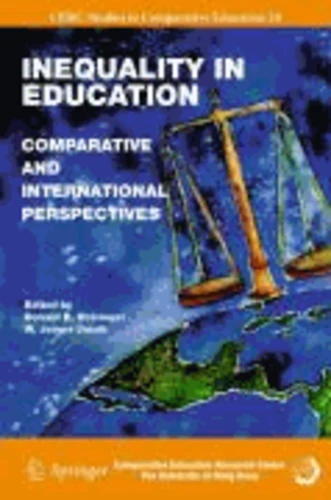Inequality in Education. Comparative and International Perspectives
Par :Formats :
- Paiement en ligne :
- Livraison à domicile ou en point Mondial Relay estimée à partir du 5 décembreCet article sera commandé chez un fournisseur et vous sera envoyé 10 jours après la date de votre commande.
- Retrait Click and Collect en magasin gratuit
- Livraison à domicile ou en point Mondial Relay estimée à partir du 5 décembre
- PrésentationCartonné
- Poids1.04 kg
- Dimensions16,6 cm × 24,3 cm × 3,8 cm
- ISBN978-90-481-2651-4
- EAN9789048126514
- Date de parution01/06/2009
- CollectionCERC Studies in Comparative Educ...
- ÉditeurSpringer
Résumé
Inequality in Education: Comparative and International Perspectives is a compilation of conceptual chapters and national case studies that includes a series of methods for measuring education inequalities. The book provides up-to-date scholarly research on global trends in the distribution of formal schooling in national populations. It also offers a strategic comparative and international education policy statement on recent shifts in education inequality, and new approaches to explore, develop and improve comparative education and policy research globally.
Contributing authors examine how education as a process interacts with government finance policy to form patterns of access to education services. In addition to case perspectives from 18 countries across six geographic regions, the volume includes six conceptual chapters on topics that influence education inequality, such as gender, disability, language and economics, and a summary chapter that presents new evidence on the pernicious consequences of inequality in the distribution of education.
The book offers (1) a better and more holistic understanding of ways to measure education inequalities; and (2) strategies for facing the challenge of inequality in education in the processes of policy formation, planning and implementation at the local, regional, national and global levels.
Contributing authors examine how education as a process interacts with government finance policy to form patterns of access to education services. In addition to case perspectives from 18 countries across six geographic regions, the volume includes six conceptual chapters on topics that influence education inequality, such as gender, disability, language and economics, and a summary chapter that presents new evidence on the pernicious consequences of inequality in the distribution of education.
The book offers (1) a better and more holistic understanding of ways to measure education inequalities; and (2) strategies for facing the challenge of inequality in education in the processes of policy formation, planning and implementation at the local, regional, national and global levels.
Inequality in Education: Comparative and International Perspectives is a compilation of conceptual chapters and national case studies that includes a series of methods for measuring education inequalities. The book provides up-to-date scholarly research on global trends in the distribution of formal schooling in national populations. It also offers a strategic comparative and international education policy statement on recent shifts in education inequality, and new approaches to explore, develop and improve comparative education and policy research globally.
Contributing authors examine how education as a process interacts with government finance policy to form patterns of access to education services. In addition to case perspectives from 18 countries across six geographic regions, the volume includes six conceptual chapters on topics that influence education inequality, such as gender, disability, language and economics, and a summary chapter that presents new evidence on the pernicious consequences of inequality in the distribution of education.
The book offers (1) a better and more holistic understanding of ways to measure education inequalities; and (2) strategies for facing the challenge of inequality in education in the processes of policy formation, planning and implementation at the local, regional, national and global levels.
Contributing authors examine how education as a process interacts with government finance policy to form patterns of access to education services. In addition to case perspectives from 18 countries across six geographic regions, the volume includes six conceptual chapters on topics that influence education inequality, such as gender, disability, language and economics, and a summary chapter that presents new evidence on the pernicious consequences of inequality in the distribution of education.
The book offers (1) a better and more holistic understanding of ways to measure education inequalities; and (2) strategies for facing the challenge of inequality in education in the processes of policy formation, planning and implementation at the local, regional, national and global levels.

